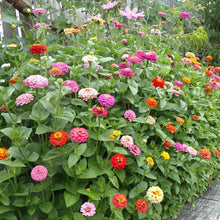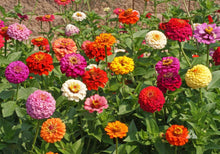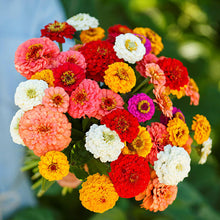Up for sale is one pack of 200 Zinnia Pumila "Cut and Come Again" Flower Seeds. These flowers grow 24" tall and create small semi-double, and fully double 2" flowers
in shades of purple, red, lilac, pink, yellow, and white. Very vigorous in the garden and the more you cut them the more flowers they will produce.
We offer flat rate combined shipping on all orders, no limit on the amount or type of seed packets.
CULTURE,
Soil temperature: 70-80 degrees fahrenheit
Germination lighting: Light required
Germination days: 10 days
Planting Depth: 1/4"
Plant spread: 24"
Plant height: 24''
Plant type: Annual
Maturation days: 75 days
In spring loosen enriched garden soil down to a 6" depth. Zinnia can be started early in pots but for best results we highly recommend you direct seed them in late spring once the temperature warms up to a consistent low in the 70's during the day. They prefer some light exposure so we press them into the soil and cover them lightly with peat. You can also use sand. Once the plant is 4" tall pinch down about a inch or so to encourage branching. Zinnia's are one of the few flowers that are not affected by high summer heat and we generally sow one set in late spring and one set in early summer to ensure blooms all summer long. They are also very "hungry" so we recommend foliar feeding at least bi-weekly once the plant is mature, and amending the soil with compost or a mild garden fertilizer (10-10-10) once in the middle of their life cycle (generally when they reach their full height).






